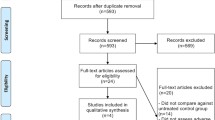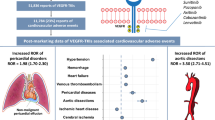Abstract
Purpose
High-grade bleeding is a serious adverse event associated with bevacizumab, a humanized monoclonal antibody targeting vascular endothelial growth factor and widely used in the current cancer treatments. The aim of this study was to gain a better understanding of the overall incidence and risk of high-grade bleeding in cancer patients who receive bevacizumab therapy.
Methods
We performed a meta-analysis of relevant randomized controlled trials (RCTs) identified in PubMed, Cochrane library, Embase, and American Society of Clinical Oncology conferences. Overall relative risks (RRs), incidence rates, and 95% confidence intervals (CIs) were calculated using a random-effects model. The primary clinical endpoint was high-grade bleeding (grade 3 or above).
Results
A total of 14,277 patients with a variety of solid tumors from 22 RCTs were included in the present analysis. The addition of bevacizumab to cancer chemotherapy significantly increased the risk of high-grade bleeding (RR 1.60, 95% CI 1.19–2.15), with RRs of high-grade bleeding among patients receiving bevacizumab at 2.5 and 5 mg/kg per week of 1.27 (95% CI 0.95–1.71) and 3.02 (95% CI 1.85-4.95), respectively. The overall incidence of high-grade bleeding among patients receiving bevacizumab was 2.8% (95% CI 2.1–3.8). Higher risks were observed in patients with non-small-cell lung cancer (RR 3.41, 95% CI 1.68–6.91), renal cell carcinoma (RR 6.37, 95% CI 1.43–28.33), and colorectal cancer (RR 9.11, 95% CI 1.70–48.79) who were receiving bevacizumab at 5 mg/kg per week.
Conclusions
Among the patients included in the trials analyzed in this meta-analysis, the addition of bevacizumab to cancer chemotherapy significantly increased the risk of high-grade bleeding. The risk may be dose-dependent and may vary with tumor type.






Similar content being viewed by others
Reference
Folkman J (1971) Tumor angiogenesis: therapeutic implications. N Engl J Med 285:1182–1186
Folkman J (2002) Role of angiogenesis in tumor growth and metastasis. Semin Oncol 29:15–18
Gerber HP, Ferrara N (2005) Pharmacology and pharmacodynamics of bevacizumab as monotherapy or in combination with cytotoxic therapy in preclinical studies. Cancer Res 65:671–680
Giantonio BJ, Catalano PJ, Meropol NJ, O’Dwyer PJ, Mitchell EP, Alberts SR, Schwartz MA, Benson AB 3rd (2007) Bevacizumab in combination with oxaliplatin, fluorouracil, and leucovorin (FOLFOX4) for previously treated metastatic colorectal cancer: results from the Eastern Cooperative Oncology Group Study E3200. J Clin Oncol 25:1539–1544
Hurwitz H, Fehrenbacher L, Novotny W, Cartwright T, Hainsworth J, Heim W, Berlin J, Baron A, Griffing S, Holmgren E, Ferrara N, Fyfe G, Rogers B, Ross R, Kabbinavar F (2004) Bevacizumab plus irinotecan, fluorouracil, and leucovorin for metastatic colorectal cancer. N Engl J Med 350:2335–2342
Hurwitz HI, Fehrenbacher L, Hainsworth JD, Heim W, Berlin J, Holmgren E, Hambleton J, Novotny WF, Kabbinavar F (2005) Bevacizumab in combination with fluorouracil and leucovorin: an active regimen for first-line metastatic colorectal cancer. J Clin Oncol 23:3502–3508
Kabbinavar F, Hurwitz HI, Fehrenbacher L, Meropol NJ, Novotny WF, Lieberman G, Griffing S, Bergsland E (2003) Phase II, randomized trial comparing bevacizumab plus fluorouracil (FU)/leucovorin (LV) with FU/LV alone in patients with metastatic colorectal cancer. J Clin Oncol 21:60–65
Saltz LB, Clarke S, Díaz-Rubio E, Scheithauer W, Figer A, Wong R, Koski S, Lichinitser M, Yang TS, Rivera F, Couture F, Sirzén F, Cassidy J (2008) Bevacizumab in combination with oxaliplatin-based chemotherapy as first-line therapy in metastatic colorectal cancer: a randomized phase III study. J Clin Oncol 26:2013–2019
Kabbinavar FF, Schulz J, McCleod M, Patel T, Hamm JT, Hecht JR, Mass R, Perrou B, Nelson B, Novotny WF (2005) Addition of bevacizumab to bolus fluorouracil and leucovorin in first-line metastatic colorectal cancer: results of a randomized phase II trial. J Clin Oncol 23:3697–3705
Sandler A, Gray R, Perry MC, Brahmer J, Schiller JH, Dowlati A, Lilenbaum R, Johnson DH (2006) Paclitaxel-carboplatin alone or with bevacizumab for non-small-cell lung cancer. N Engl J Med 355:2542–2550
Miller K, Wang M, Gralow J, Dickler M, Cobleigh M, Perez EA, Shenkier T, Cella D, Davidson NE (2007) Paclitaxel plus bevacizumab versus paclitaxel alone for metastatic breast cancer. N Engl J Med 357:2666–2676
Miles D, Chan A, Romieu G, Dirix LY, Cortes J, Pivot X, Tomczak P, Taran T, Harbeck N, Steger GG (2008) Randomized, double-blind,placebo-controlled, phase III study of bevacizumab with docetaxel or docetaxel with placebo as first-line therapy for patients with locally recurrent or metastatic breast cancer (mBC): AVADO. Proc Am Soc Clin Oncol 26:LBA1011
Miller KD, Chap LI, Holmes FA, Cobleigh MA, Marcom PK, Fehrenbacher L, Dickler M, Overmoyer BA, Reimann JD, Sing AP, Langmuir V, Rugo HS (2005) Randomized phase III trial of capecitabine compared with bevacizumab plus capecitabine in patients with previously treated metastatic breast cancer. J Clin Oncol 23:792–799
Rini BI, Halabi S, Rosenberg JE, Stadler WM, Vaena DA, Ou SS, Archer L, Atkins JN, Picus J, Czaykowski P, Dutcher J, Small EJ (2008) Bevacizumab plus interferon alfa compared with interferon alfa monotherapy in patients with metastatic renal cell carcinoma: CALGB 90206. J Clin Oncol 26:5422–5428
Escudier B, Pluzanska A, Koralewski P, Ravaud A, Bracarda S, Szczylik C, Chevreau C, Filipek M, Melichar B, Bajetta E, Gorbunova V, Bay JO, Bodrogi I, Jagiello-Gruszfeld A, Moore N (2007) Bevacizumab plus interferon alfa-2a for treatment of metastatic renal cell carcinoma: a odifyzed, double-blind phase III trial. Lancet 370:2103–2111
Genentech. Bevacizumab prescribing information. Available at; http://www.Gene.com/gene/products/information/oncology/avastin/. Accessed 27 Oct 2008
Reck M, von Pawel J, Zatloukal P, Ramlau R, Gorbounova V, Hirsh V, Leighl N, Mezger J, Archer V, Moore N, Manegold C (2009) Phase III trial of cisplatin plus gemcitabine with either placebo or bevacizumab as first-line therapy for nonsquamous non-small-cell lung cancer: AVAil. J Clin Oncol 27:1227–1234
Johnson DH, Fehrenbacher L, Novotny WF, Herbst RS, Nemunaitis JJ, Jablons DM, Langer CJ, DeVore RF, Gaudreault J, Damico LA, Holmgren E, Kabbinavar F (2004) Randomized phase II trial comparing bevacizumab plus carboplatin and paclitaxel with carboplatin and paclitaxel alone in previously untreated locally advanced or metastatic non-small-cell lung cancer. J Clin Oncol 22:2184–2191
Herbst RS, O’Neill VJ, Fehrenbacher L, Belani CP, Bonomi PD, Hart L, Melnyk O, Ramies D, Lin M, Sandler A (2007) Phase II study of efficacy and safety of bevacizumab in combination with chemotherapy or erlotinib compared with chemotherapy alone for treatment of recurrent or refractory non small-cell lung cancer. J Clin Oncol 25:474–4750
Allegra CJ, Yothers G, O’Connell MJ, Sharif S, Wolmark N (2008) Initial safety report of NSABP C-08, a randomized phase III study of odify ed 5-fluorouracil (5-FU)/leucovorin (LCV) and oxaliplatin (OX) (mFOLFOX6) with or without bevacizumab (bev) in the adjuvant treatment of patients with stage II/III colon cancer. Proc Am Soc Clin Oncol 26 [15 Suppl]: Abstr 4006
Van Cutsem E, Vervenne WL, Bennouna J, Humblet Y, Gill S, Van Laethem JL, Verslype C, Scheithauer W, Shang A, Cosaert J, Moore MJ (2009) Phase III trial of bevacizumab in combination with gemcitabine and erlotinib in patients with metastatic pancreatic cancer. J Clin Oncol 27:2231–2237
Kindler HL, Niedzwiecki D, Hollis D, Oraefo E, Schrag D, Hurwitz H, McLeod HL, Mulcahy MF, Schilsky RL, Goldberg RM (2007) A double-blind, placebo-controlled, randomized phase III trial of gemcitabine (G) plus bevacizumab (B) versus gemcitabine plus placebo (P) in patients (pts) with advanced pancreatic cancer (PC): a preliminary analysis of Cancer and Leukemia Group B (CALGB). Proc Am Soc Clin Oncol 25:4508
Karrison T, Kindler HL, Gandara DR, Lu C, Guterz TL, Nichols K, Chen H, Stadler WM, Vokes E (2007) Final analysis of a multi-center, double-blind, placebo-controlled, randomized phase II trial of gemcitabine/cisplatin (GC) plus bevacizumab (B) or placebo (P) in patients (pts) with malignant mesothelioma (MM). J Clin Oncol 25:7526
Yang JC, Haworth L, Sherry RM, Hwu P, Schwartzentruber DJ, Topalian SL, Steinberg SM, Chen HX, Rosenberg SA (2003) A randomized trial of bevacizumab, an anti-vascular endothelial growth factor antibody, for metastatic renal cancer. N Engl J Med 27:2231-2237
Kang Y, Ohtsu A, Van Cutsem E, Rha SY, Sawaki A, Park S, Lim H, Wu J, Langer B, Shah MA (2010) AVAGAST: A randomized, double-blind, placebo-controlled, phase III study of first-line capecitabine and cisplatin plus bevacizumab or placebo in patients with advanced gastric cancer (AGC). J Clin Oncol 28:LBA4007
Price TJ, Gebski V, van Hazel GA, Robinson BA, Broad A, Ganju V, Cunningham D, Wilson K, Tunney V, Tebbutt NC (2008) International multi-centre randomised Phase II/III study of Capecitabine (Cap), bevacizumab (Bev) and mitomycin C (MMC) as first-line treatment for metastatic colorectal cancer (mCRC): Final safety analysis of the AGITG MAX trial. J Clin Oncol 26:4029
Hambleton J, Novotny WF, Hurwitz H, Fehrenbacher L, Cartwright T, Hainsworth J, Heim W, Berlin J, Kabbinavar F, Holmgren E (2004) Bevacizumab does not pressure bleeding in patients with metastatic colorectal cancer receiving concurrent anticoagulation. J Clin Oncol 22:3528
Jadad AR, Moore RA, Carroll D, Jenkinson C, Reynolds DJ, Gavaghan DJ, McQuay HJ (1996) Assessing the quality of reports of randomized clinical trials: is blinding necessary? Control Clin Trials 17:1–12
Khan KS, Daya S, Jadad A (1996) The importance of quality of primary studies in producing unbiased systematic reviews. Arch Intern Med 156:661–666
Moher D, Jadad AR, Tugwell P (1996) Assessing the quality of randomized controlled trials. Current issues and future directions. Int J Technol Assess Health Care 12:195–208
DerSimonian R, Laird N (1986) Meta-analysis in clinical trials. Control Clin Trials 7:177–188
Je Y, Schutz FA, Choueiri TK (2009) Risk of bleeding with vascular endothelial growth factor receptor tyrosine-kinase inhibitors sunitinib and sorafenib: a systematic review and meta-analysis of clinical trials. Lancet Oncol 10:967–974
Kamba T, McDonald DM (2007) Mechanisms of adverse effects of anti-VEGF therapy for cancer. Br J Cancer 96:1788–1795
Kilickap S, Abali H, Celik I (2003) Bevacizumab, bleeding, thrombosis, and warfarin. J Clin Oncol 21:3542–3543
SandlerAB JDH, Brahmer J et al (2006) A study of clinical and radiographic risk factors associated with early onset severe pulmonary hemorrhage in bevacizumab (Avastin) treated patients with advanced non-small cell lung cancer. Proc Am Soc Clin Oncol 24:7068
Sandler AB, Schiller JH, Gray R, Dimery I, Brahmer J, Samant M, Wang LI, Johnson DH (2009) Retrospective evaluation of the clinical and radiographic risk factors associated with severe pulmonary hemorrhage in first-line advanced, unresectable non-small-cell lung cancer treated with Carboplatin and Paclitaxel plus bevacizumab. J Clin Oncol 27:1405–1412
Choueiri TK, Vaziri SA, Jaeger E, Elson P, Wood L, Bhalla IP, Small EJ, Weinberg V, Sein N, Simko J, Golshayan AR, Sercia L, Zhou M, Waldman FM, Rini BI, Bukowski RM, Ganapathi R (2008) von Hippel-Lindau gene status and response to vascular endothelial growth factor targeted therapy for metastatic clear cell renal cell carcinoma. J Urol 180:860–866
Flynn PJ, Sugrue MM, Feng S, Purdie DM, Grothey A, Sargent DJ, Berlin JD, Kabbinavar FF, Dong W, Kozloff MF (2008) Incidence of serious bleeding events (sBE) in patients (pts) with metastatic colorectal cancer (mCRC) receiving bevacizumab (BV) as part of a first-line regimen: Results from the BRITE observational cohort study (OCS). J Clin Oncol 26:4104
Hapani S, Sher A, Chu D, Wu S (2010) Increased risk of serious hemorrhage with bevacizumab in cancer patients: a meta-analysis. Oncology 79:27–38
Lau J, Ioannidis JPA, Schmid CH (1997) summing up the evidence: one answer is not always enough. Lancet 351:123–127
Thompson SG (1994) Why sources of heterogeneity in metaanalysis should be investigated. Br Med J 309:1351–1355
Acknowledgment
We are indebted to the authors of the primary studies, for without their contributions, this work would have been impossible.
Funding of the study
None
Conflict of interest
The authors state that they have no conflict of interest.
Author information
Authors and Affiliations
Corresponding author
Additional information
Xiao Feng Hang and Wen Sheng Xu contributed equally to this article and can be considered to be co-first authors
Rights and permissions
About this article
Cite this article
Hang, X.F., Xu, W.S., Wang, J.X. et al. Risk of high-grade bleeding in patients with cancer treated with bevacizumab: a meta-analysis of randomized controlled trials. Eur J Clin Pharmacol 67, 613–623 (2011). https://doi.org/10.1007/s00228-010-0988-x
Received:
Accepted:
Published:
Issue Date:
DOI: https://doi.org/10.1007/s00228-010-0988-x




